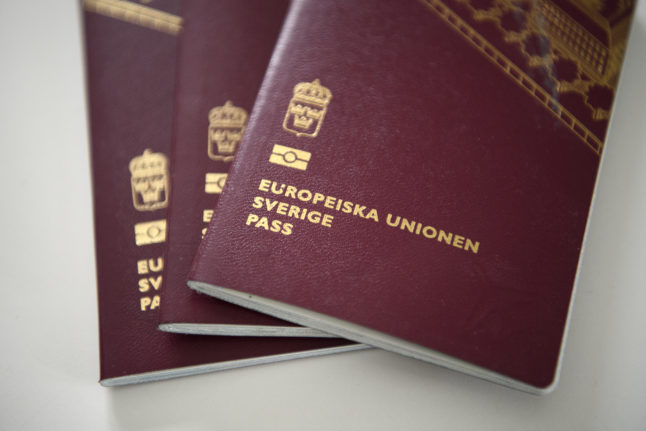Negotiations as to who will be in government are ongoing in the right-wing bloc, made up of the Sweden Democrats, the Moderates, the Christian Democrats, after their bloc won over the left-wing bloc in Sweden’s general election on September 11th.
The Sweden Democrats in particular have plans to introduce a range of strict immigration policies, such as making it harder to gain Swedish citizenship and abolishing permanent residency permits in favour of shorter temporary permits.
However, the other parties in their bloc have differing policy on all these issues, meaning that the Sweden Democrats will most likely have to compromise on their reform goals.
In some areas, the right-wing parties have shown an interest in moving in the same direction, although not going quite as far as the Sweden Democrats.
So, what areas do the right-wing parties agree on?
Changes to permanent residency permits
In general, the parties all seem to be in favour of making it more difficult to gain permanent residence permits, with the Sweden Democrats the only party in favour of abolishing them entirely.
The Liberals state that in the case of work permits, which are granted for two two-year periods, after which holders can apply for a permanent residence permit, that “there could be reasons for extending work permits by two years to a total of six years”.
The Christian Democrats are also in favour of making it more difficult to gain permanent residency permits, stating that if someone with a residence permit “integrates into Swedish society by learning the Swedish language, absorbing the Swedish culture and community, supporting themselves, proves their identity and passes a test of good conduct, they should be able to apply for and be granted a permanent residence permit”.
The Moderates are also in favour of changing rules regarding permanent residence permits, stating that “if you want permanent residency and want to become a Swedish citizen, it is therefore reasonable to learn Swedish”, adding that they want “basic knowledge” of the Swedish language to be a requirement for both permanent residency and citizenship.
The Sweden Democrats want to abolish permanent residence permits, arguing in a document on their website that “the institution of permanent residence permits clashes with the idea of increasing the value of citizenship”.
“Under the current rules, the difference between the two institutions is small, and in practice is nothing more than the right to vote,” the document says, arguing that “citizenship has become an upgraded version of a permanent residence permit.”
“In order to preserve the sanctity of citizenship, the right of foreigners to stay in Sweden should never be allowed to approach that of Swedish citizens,” it reads.
Changes to citizenship
The four parties in the right-wing bloc also seem to agree on the fact that it should be more difficult to get Swedish citizenship, with two parties proposing that immigrants must be in Sweden for longer than the current standard of five years (three years in some cases) in order to qualify for citizenship.
The Christian Democrats are in favour of introducing language and culture tests for citizenship, as well as exploring the possibility of refusing ciizenship to people who have committed serious or repeated crimes. They also want to be able to revoke citizenship to people who gained it “by fraudulent means”, such as through bribery, or for people with dual citizenship who have committed terror or war crimes.
The Liberals are also in favour of introducing language tests for citizenship, arguing that it “strengthens the status of citizenship and is an important symbol for the principle that everyone in society should be able to communicate with each other”.
They are also in favour of introducing a “society test”, which will be followed by a personal interview to “mark the personal commitment and familiarity with both language and the rights and obligations that citizenship entails”.
The Moderates also approve of introducing language and culture tests for citizenship, stating that “basic knowledge of society and Swedish should be required for citizenship”. In addition to this, they want to raise the time limit for qualifying for citizenship from five to eight years.
Finally, they also want to make it possible to revoke citizenship – in line with international law, so this would only be for those who would not be left stateless by such a decision – for those who have lied about their identity, provided fraudulent information or committed a serious crime, such as a terror crime.
The Sweden Democrats have the most restrictive plans for citizenship, wanting to raise the qualification period from five years to ten years, alongside “well-regulated requirements for citizenship applications,” such as “mastery of the Swedish language and knowledge of fundamental facts about Sweden, our society and our history, as well as current laws and rules, responsibilities as well as rights”, which “can and should be confirmed via testing before citizenship can be granted”.
The party also wants to require that prospective applicants include an “explanation that they have understood the responsibilities and duties citizenship entails” in their citizenship application.
They state that this could include “knowledge of Swedish culture, history, democratic and secularised societal model as well as convincingly professing respect for Western standards of human rights such as freedom of expression, freedom of religion, the equal value and rights of both sexes and respect for people with different sexual orientation”.
What does this mean?
It is hard to predict what could happen in the next four years if Moderate leader Ulf Kristersson is successful in forming a government with the support of these four parties. However, the right bloc appear to be united on two fronts: language and citizenship tests, and making it more difficult to gain permanent residency in Sweden.
What exact form these reforms will take are likely to become a lot clearer when the four parties announce a common government programme, probably over the next few weeks.



 Please whitelist us to continue reading.
Please whitelist us to continue reading.
Looks like, we will most likely see some proposals on tighter requirements for permanent residency and citizenship. Isn’t there a proposal already in place which is in inquiry stage till next May, which was posted by the last government regarding the mandatory language requirements for permanent residency? And a similar language test which was proposed to be implemented in Jan 2025. What will happen to these?
It is also possible that the current proposal raised by last government for language requirements for PR will likely be approved in May or June 2023, right?
As a non-EU citizen, my case for a getting a PR is getting worse day by day. I have already held RP/WP for 4 years (also completed my 44 months of stay) in Sweden last month. But during my Resident Permit extension which I applied in March 2022, unfortunately got it extended till April 2024 due to rule changes which happened on 1st June 2022. Because of this, now I have to wait till April 2024 to apply for PR. I would have also completed my 5 years of stay in Sweden by August 2023, which means I would have qualified for citizenship by then. Without a PR in place, citizenship is not possible. Now, with all these new proposals are in talks, all my PR and Citizenship wishes will look like a distant dream. Now, I have to say myself that I must wait for 2 more years for a PR by learning Svenska which I’m doing it now. 🙂 How pity me.. 🙂
The language proposals seem reasonable. In France, when applying as a non EU citizen for a 10 year titre de sejour there is a language requirement, I believe that level is A2, or maybe B1. It is not so hard to achieve. If one is over the age of 65 it is not required. There are also integration classes. Citizenship requires more. The other SD proposals will likely crash against EU regs.